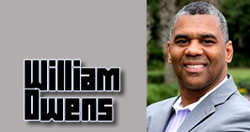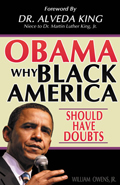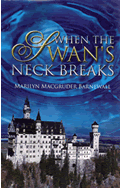By
William Owens, Jr.
November 29, 2014
NewsWithViews.com
The people of Ferguson, Missouri are sitting on a powder keg.
As the nation waits to learn whether or not a grand jury will indict Officer Darren Wilson for the death of Michael Brown, we also are holding our collective breath to see what the effect of the decision, regardless of what it is, will have on that community. If history is any indication, the city is likely to again explode in a hailstorm of hatred, violence and vengeance.
We can do better.
To be sure, the problem extends far beyond the boundaries of Ferguson. All of America has become a vengeful society in many respects. Politicians attack each other mercilessly, not just during bitterly-fought campaigns, but in the very halls of Congress. Business, religious institutions, communities, personal relationships – all have become examples of our growing culture of vengeance.
The specter of vengeance in our cultural relationships is particularly disturbing because it is a part of our history and our national fabric that we should have gotten past by now, and yet the deep wounds of yesteryear – slavery, civil rights, inequality – remain unhealed and vivid in our minds.
Nowhere is this more evident than in the tragic situation that has evolved from the death of Michael Brown. My heart hurts when I think of the life that was snuffed out before it really began, and I also hurt for Officer Wilson, whose life has been forever changed regardless of the eventual legal outcome.
And of course I think of Michael’s parents, whose wounds are still fresh. In their ongoing quest to find healing for their pain and seek justice for their son, they recently traveled to all the way to Geneva to speak at a United Nations human rights conferencein an attempt to establishpurpose and meaning for their loss.
The fact that Officer Wilson’s culpability has not yet been determined – and that much of the evidence in the case is quite contradictory – has not eased their pain. The protests, riots, arrests and further violence in the streets of Ferguson that have occurred and may occur again, have not eased their pain. And, I would submit that taking their case to the United Nations, lofty as that ideal may seem, will also fail to ease their pain, not only because the UN has no jurisdiction or influence over their situation, but moreso because the UN has no power to reach into the heart – where their pain lives.
Unfortunately, the Brown case, like the Travon Martin case and others like it, has become yet another example of our growing culture of vengeance. It needs to stop now.
There is only one thing that will ultimately ease the pain of the Ferguson community, the nation, and even the Brown family itself, and that is forgiveness.
The leaders of the Ferguson community, and even the Brown family themselves, have a tremendous opportunity to demonstrate the wisdom of Dr. Martin Luther King, Jr. He wrote these words while imprisoned for committing civil disobedience during the Montgomery bus boycott and delivered them at a 1957 Christmas service at Montgomery’s Dexter Avenue Baptist Church:
“First, we must develop and maintain the capacity to forgive. He who is devoid of the power to forgive is devoid of the power to love. It is impossible even to begin the act of loving one's enemies without the prior acceptance of the necessity, over and over again, of forgiving those who inflict evil and injury upon us. It is also necessary to realize that the forgiving act must always be initiated by the person who has been wronged, the victim of some great hurt, the recipient of some tortuous injustice, and the absorber of some terrible act of oppression.”
As always, Dr. King took his inspiration from the Word of God. No matter how many times he was jailed or beaten or had his family’s safety threatened, he refused to seek vengeance but instead forgave.
Ferguson can forgive too
To me, it is especially distressing to see that some of the so-called “advisors” who have been exerting influence over the Ferguson community – and pushing them toward vengeance and away from forgiveness – are church leaders. It saddens me to see that at a time when our religious institutions are critically needed, many of our nation’s pulpits have become affected by this trend. Many of these leaders in Ferguson claim to hold Dr. King in the highest esteem, yet they refuse to follow either his teachings or his example.
Dr. King used his pulpit not to advocate a culture of vengeance and hatred, but rather one of forgiveness and reconciliation. Let us join him in his jail cell and peek over his shoulder as he writes these words:
“The words ‘I will forgive you, but I'll never forget what you've done’ never explain the real nature of forgiveness. Certainly one can never forget, if that means erasing it totally from his mind. But when we forgive, we forget in the sense that the evil deed is no longer a mental block impeding a new relationship. Likewise, we can never say, ‘I will forgive you, but I won't have anything further to do with you.’ Forgiveness means reconciliation, a coming together again.”
The people of Ferguson have an opportunity to make history. They can break the cycle of vengeance in America and become a beacon of light, beginning a new demonstration of God’s love through acts of forgiveness. After all, our lives are not measured in the number of years we live; they are measured by the amount of grace and love that we give.
Forgiveness must extend to everyone, even those whose acts we find completely reprehensible. It must extend even to groups like ISIS, whose cruelty is beyond comprehension. Witnessing the evil they commit gives those of us within the Christian community an opportunity to demonstrate the real God by allowing their deeds to provoke not vengeance, but forgiveness.
As Christians, we are compelled to go beyond merely giving lip service to the concept of forgiveness and take bold action according to God’s narrative. That’s why I have committed to a bike trek of more than 2,600 miles – from Coast to Coast – in the spring of 2015. During this 90-day Race to Reconcile journey, I will visit churches, orphanages, veterans’ homes, schools – any place where I can share the message that our only true salvation will come through the essential acts of forgiveness and reconciliation. It all begins however December 17,,2014 in Tallahassee, FL where we will live stream a “Celebration Forgiveness” panel discussion from leaders within the community. Not to identify our differences or to debate religion, but to identify how through the power of forgiveness we can heal and to promote forgiveness.
|
|
As we wait for the grand jury’s decision, I see the anguish in the faces of Michael Brown’s parents and in the streets of Ferguson, and it is not the result of what transpired on August 9 or the manner in which the police responded to it. It is the result of our country’s culture of vengeance and our seeming incapacity to forgive. This is true among both blacks and whites, and it extends far beyond the boundaries of Ferguson, Missouri into every community in this nation.
That’s why I implore the leaders in Ferguson with the encouragement of Michaels Brown’s parents to lead the charge away from vengeance and toward forgiveness and reconciliation. I urge them to imagine what Dr, King would advise if he was in their living room; to stop listening to those who are using them to further their own agendas and instead allow their son’s tragic death to usher in a new wave of forgiveness, love and grace.
Jesus Christ said it on the cross: “Forgive them, for they know not what they do.”
It’s time for all of us to do the same.
For
me to live is to forgive
For me to rise
To thrive
To be the person God made me
My heart must be ever so free
Of fault toward others
No matter what they've done or do to me…
William Owens is the Author of: Obama: Why Black America Should Have Doubts
� 2014 William Owens, Jr. - All Rights Reserved
William Owens is a prolific author, having written seven books in the Christian literature genre, including Divine Protocol, Obama: Why Black America Should Have Doubts, and Warriors Arise. He most recent work; Naked Before God - Words that Express My Heart is a compilation of his poetry that debuts Christmas 2014. Owens has spent two decades in the publishing industry and is also a noted activist within the Christian and Conservative communities. His current project is Race to Reconcile, a coast-to-coast bike trek in the Spring of 2015. The journey, which will include stops at orphanages, veterans’ homes, soup kitchens and prisons, is designed to inspire acts of forgiveness that will lead to reconciliation to God and one another regardless of color, religion, political affiliation and other differences. Owens’ new book, entitled Race to Reconcile: A Christian Approach to Strengthening Race Relations in America, will debut at the same time and will feature stories and experiences continuing the message of forgiveness and reconciliation. He is also launching a series of panel discussions throughout the nation called, “Celebration Forgiveness”.
E-Mail: william@relevantproductions.net
Websites:












 Share
This Article
Share
This Article





